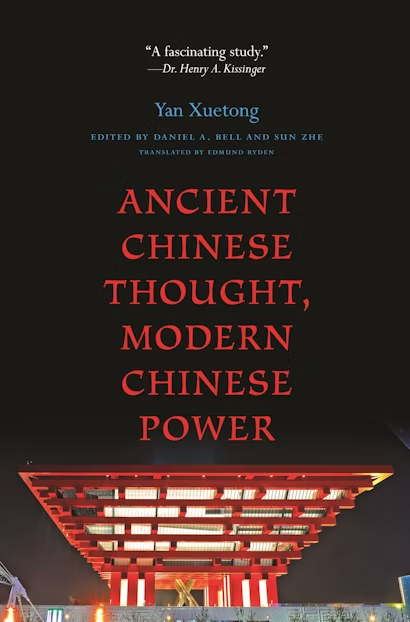The rise of China could be the most important political development of the twenty-first century. What will China look like in the future? What should it look like? And what will China’s rise mean for the rest of world? This book, written by China’s most influential foreign policy thinker, sets out a vision for the coming decades from China’s point of view.
In the West, Yan Xuetong is often regarded as a hawkish policy advisor and enemy of liberal internationalists. But a very different picture emerges from this book, as Yan examines the lessons of ancient Chinese political thought for the future of China and the development of a “Beijing consensus” in international relations. Yan, it becomes clear, is neither a communist who believes that economic might is the key to national power, nor a neoconservative who believes that China should rely on military might to get its way. Rather, Yan argues, political leadership is the key to national power, and morality is an essential part of political leadership. Economic and military might are important components of national power, but they are secondary to political leaders who act in accordance with moral norms, and the same holds true in determining the hierarchy of the global order.
Providing new insights into the thinking of one of China’s leading foreign policy figures, this book will be essential reading for anyone interested in China’s rise or in international relations.
Yan Xuetong is professor of political science and director of the Institute of International Studies at Tsinghua University in Beijing. His many books include The Rise of China and Its Strategy, International Politics and China, and American Hegemony and China's Security.
"Highly recommended."—Malcolm Warner, Asia Pacific Business Review
"For those who welcome a China that is increasingly active at the global level, as well as for those who do not, it seems the time is right to thoroughly engage with the ideas and proposals of prominent Chinese thinkers today like Yan Xuetong. By putting his grand vision for a Chinese 'superpower modelled on humane authority' to the test before it becomes a possible political reality, we will have gained a greater appreciation of China's cultural heritage and, following that, a glimpse at its possible political future."—Mark Chou, Australian Review of Public Affairs
"Thought-provoking."—Kerry Brown, Asian Affairs
"The volume provides stimulating insights not only into the rich world of ancient Chinese thought, but also into the way contemporary Chinese thinkers see the world today. . . . The excellent introduction by Daniel Bell and a long interview with Xuetong in the appendix are especially rewarding."—Michael Rochlitz, Political Studies Review
"China's great thinkers from the time of Confucius are known for their profound contributions to philosophy, ethics, and military strategy. Less appreciated in the West is their sophisticated thinking about statecraft. The incessant conflicts among the fragmented principalities that eventually formed a unified China in 221 BC produced a rich flowering of conceptual thinking on issues of governance and interstate relations. In this fascinating study, inquiring readers will find a wealth of information regarding how ancient China's strategic sages assessed the factors determining the success or failure of rulers and states, with immediate relevance for better understanding the implications of China's current rise to wealth and power."—Dr. Henry A. Kissinger
"China's increasing strength and influence in the modern world are confronting Chinese with a new set of intellectual challenges in assessing how the country's enhanced status will affect Chinese behavior, how other countries will react, and what policies China should adopt to optimize its interests. Not surprisingly, thoughtful Chinese are looking for clues in their distant past, two and a half millennia ago, when the competition over six centuries among the political enclaves that eventually formed a united China prompted an outpouring of philosophical thinking on issues of statecraft. This stimulating book examines this thinking in ways relevant both to international relations theory and China's emerging position in world affairs."—J. Stapleton Roy, former U.S. ambassador to China
"Xuetong Yan, one of China's liveliest and most provocative international relations scholars, provides an excellent introduction to ancient Chinese theories of statecraft. Combined with the responses of his critics, his thoughtful essays reveal the exciting intellectual ferment among China's international relations thinkers. Many of the concepts are recognizable to Western scholars, some are not, but Yan's masterful effort to show how all these ideas might be relevant to China's 'rise' should be read by everyone who is interested in understanding how the past may influence the present."—Alastair Iain Johnston, Harvard University

